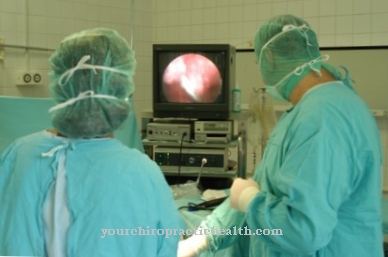aspiration or. Swallow is the penetration of a foreign body (food, liquid, objects) into the respiratory tract during inhalation. There is an increased risk of aspiration, especially for older people or people in need of care, as well as younger children.
What is aspiration
.jpg)
Aspiration is the penetration of food, vomit or other foreign bodies into the tracheobronchial system during inspiration (inhalation). If foreign bodies get into the airways, a cough reflex is usually triggered, through which they are supposed to be transported out of the organism.
If this process of coughing remains unsuccessful, however, larger aspirated foreign bodies can block the windpipe, so that the person concerned can no longer breathe (dyspnea) and threatens to suffocate.Aspiration can also manifest itself in convulsive (spasmodic) attempts to breathe as a result of spasms in the bronchial muscles (bronchospasm) and blue-gray discoloration of the skin (cyanosis) in atelectasis (ventilation deficit in a section of the lung).
Smaller foreign bodies can also penetrate the lungs, damage the tissue structures there and, in addition to a ventilation deficit, cause local inflammatory reactions. As a result, aspiration pneumonia can develop, which can be severe and sometimes fatal, especially for older people.
causes
Aspiration is favored by reduced tongue mobility (e.g. in Parkinson's disease), a disturbed swallowing process, by increased vomiting or by the presence of reurgitation (pathological backflow of gastric juice or chyme into the oral cavity).
There is also an increased risk of aspiration in people who have not eaten or have been intubated for a long period of time, in those affected by certain neurological impairments (stroke, myasthenia gravis) and in confused, elderly people.
In addition, younger children, who primarily use their mouths to explore their environment, have an increased risk of aspiration of food (e.g. peanuts), toys or other smaller objects such as coins.
Diseases with this symptom
- Parkinson's
- Achalasia
- bronchial asthma
- stroke
- Foreign body aspiration
- heatstroke
- Myasthenia gravis pseudoparalytica
- lung infection
- Reflux disease
Diagnosis & course
Aspiration is usually diagnosed on the basis of the "classic symptom triad" consisting of cough, reduced breathing noise and whistling. The present symptoms partially correlate with the location of the aspirated foreign body.
In the case of an aspirated object in the trachea (windpipe) or larynx (larynx), depending on the constriction present, there are pronounced symptoms with inspiratory stridor (breathing noises when inhaling), while a foreign body in the bronchial system after an initial coughing attack often only has a minor difficulty in breathing caused.
In addition, coughs and recurrent (recurring) respiratory infections can indicate chronic aspiration in which the foreign body has been in the bronchial system for a long time.
The diagnosis is usually confirmed by a chest x-ray. If the foreign body is removed promptly, aspiration usually goes well. However, chronic aspiration can lead to hemoptysis, lung abscesses, bronchiectasis, pneumomediastinum or a pneumothorax in the long term.
Complications
Aspiration can cause numerous complaints. When a foreign body is aspirated, the focus is on the rapid removal of this foreign body from the airways. However, if this is not the case, complications are likely to arise. If the aspirated foreign body is not removed in time, there is a high probability of an inflammatory reaction in the airways.
If this is the case, antibiotic treatment is usually necessary. On the one hand, this is due to the fact that the foreign body is mostly bacterially contaminated. On the other hand, the aspirated foreign body damages the mucous membrane, which makes it more susceptible to bacterial colonization. In addition, severe reactions can occur, especially when aspirating strongly spicy foods. If so, an anti-inflammatory drug is indicated to suppress this reaction. However, the most dangerous complication of aspiration is suffocation. If the foreign body cannot be coughed up and settles in the windpipe, there is a risk of suffocation.
The risk of suffocation from aspiration is significantly increased, especially in children. Aspiration of swelling things can also lead to suffocation, as these can inevitably come into contact with liquid. Because of the complications mentioned, rapid help is required during aspiration. Aspiration of a foreign body can be an acute, life-threatening emergency.
When should you go to the doctor?
Consultation with a doctor should be decided on an individual basis for aspiration. In most cases, the affected person has a reflex coughing attack. The foreign bodies are transported from the windpipe back into the oral cavity or spat out. The substance is removed in this way without any further after-effects. Usually no further damage remains.
If there is still pain or discomfort afterwards, a check-up visit to the doctor is recommended. This can support the further healing process with medication or check whether there are still foreign substances in the windpipe. If the foreign body cannot be removed by one's own strength, there is a risk of suffocation without a doctor's visit. If aspiration occurs in children, a doctor should be consulted immediately. If a foreign substance remains in the windpipe for a long time, there is an increased risk of further diseases.
It is therefore highly recommended to consult a doctor if a consciously induced cough is unsuccessful. The risk of pneumonia or lung failure is too great. If aspiration occurs regularly and repeatedly, various therapeutic measures can be very helpful. Swallowing therapy from a speech therapist or occupational therapist can bring about long-term changes and achieve success. The aim of an initiated therapy is the reduction or permanent healing of the aspiration.
Doctors & therapists in your area
Treatment & Therapy
In many cases, the aspirated foreign body is transported out again by itself through strong coughing. If this does not succeed, first aid measures may be indicated. To do this, the person affected is struck vigorously between the shoulder blades with the flat of the hand in a bent forward position to initiate coughing up the aspirated foreign body.
Afterwards, if you fail to cough, the Heimlich handle can be used, which is, however, controversial due to possible internal injuries (diaphragmatic rupture, injuries to the stomach wall). In the case of severe ventilation deficits (respiratory and cardiac arrest), resuscitation (resuscitation through heart-lung massage) may also be necessary. Aspirated foreign bodies that cannot be removed with the methods described are usually extracted with optical forceps (upper airways) or endoscopically as part of a bronchoscopy (reflection of the trachea and bronchi).
For this purpose, a thin, elastic tube with a camera and a suction device (bronchoscope) is inserted through the windpipe into the lower respiratory tract in order to suck off accumulated secretion and the aspirated foreign body. The extracted secretion is then examined microbiologically for pathogens that could have entered the airways with the aspirated foreign body. Antibiotics are used prophylactically regardless of the microbiological result. In the case of chronic aspiration, antibiotic therapy is usually recommended prior to bronchoscopy.
Outlook & forecast
Aspiration can lead to various complications that can even lead to death. Usually, aspiration occurs primarily in young children. They tend to put objects in their mouths and choke on them. However, aspiration also occurs frequently in adults, for example when small objects are held in the mouth and the patient chokes on them.
In most cases, the foreign body can be removed in good time so that inflammation does not occur. However, if the foreign body remains in the lungs for a long time, death from suffocation will result. Therefore, first aid measures should always be taken immediately after aspiration and an emergency doctor should be called.
If aspiration occurs with spicy or spicy food, the bronchial system is heavily stressed and can become inflamed. This inflammation is treated with antibiotics and usually does not lead to further complications.
Often the aspiration itself is eliminated by the body by coughing up the foreign body and does not lead to dangerous situations.
prevention
The so-called aspiration prophylaxis comprises measures that prevent the ingestion of food or other foreign bodies. These include, for example, abstinence from fluids and food in the run-up to predictable operations, elevation of the upper body while ingesting food for people in need of care, sufficient time to eat and drink as well as adequate oral hygiene to remove food residues after eating. In addition, small children should be prevented from coming into contact with small parts (nuts, coins, Lego blocks) in order to prevent aspiration.
You can do that yourself
In the event of aspiration (swallowing) with shortness of breath, an emergency doctor should always be called in for safety. If the air is not completely removed, a strong cough often helps to remove possible foreign bodies and reduce aspiration. Creating a nausea also sometimes helps to remove objects from the throat.
In general, you can first try to manually remove foreign bodies or liquids that have entered the windpipe when swallowing. If this does not succeed and convulsive attempts to breath occur, the emergency services must be alerted. Until this arrives, the upper body of the person concerned should be bent over. As an immediate measure, strong blows against the shoulder blades can trigger a cough that often expels the foreign body. If this does not help, the stealth grip should be used. If breathing has stopped, further life-saving measures must be carried out. In addition, if possible, a third party should identify what the foreign body is in order to facilitate acute treatment in the hospital.
If swallowed as a result of an allergic reaction, it is important to remain calm and breathe in slow breaths until professional help arrives. Ingestion during an asthma attack can be treated with an asthma spray. In the event of regular aspiration for no apparent reason, a doctor should be consulted.

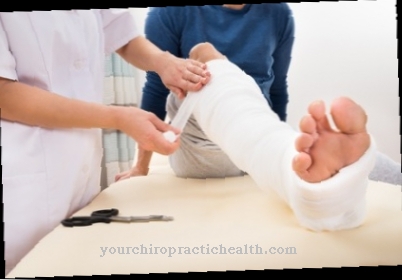

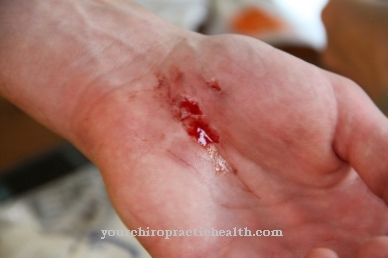








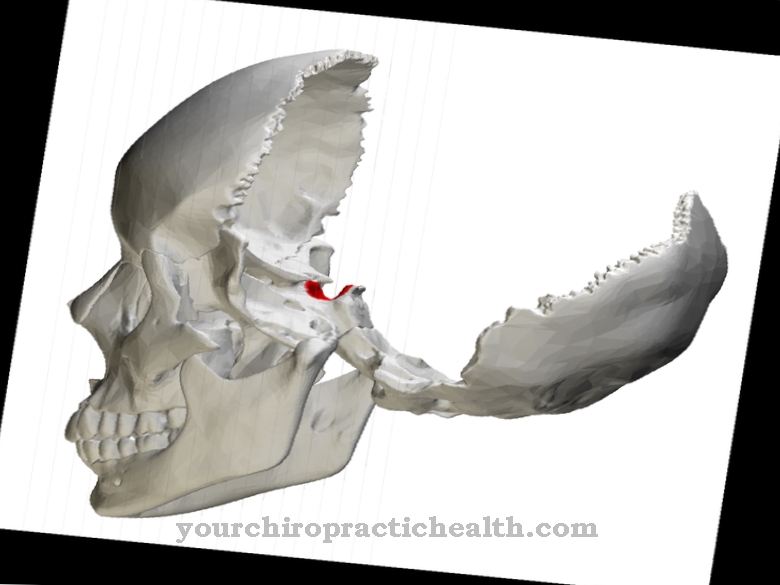
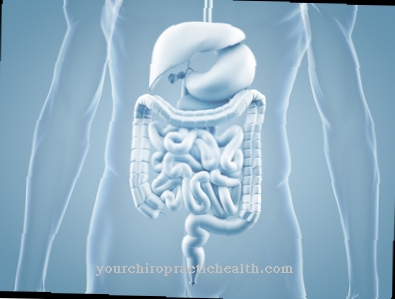

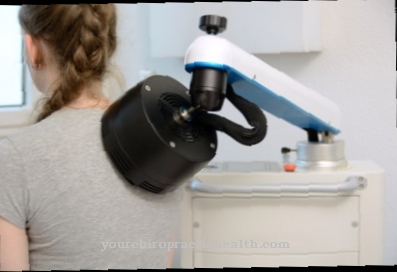
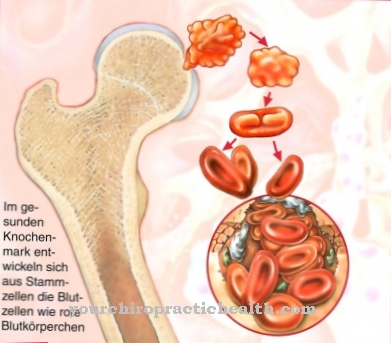






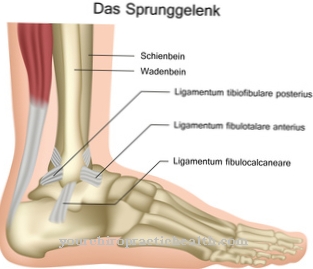

.jpg)

.jpg)
